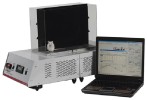Authors
Hache G, Guiard BP, Le Dantec Y, Orvoën S, David DJ, Gardier AM, Coudoré F.
Lab
Lab NeuroPharmacology, Faculty of Pharmacy, Paris Sud University, Paris, France
Journal
Neuroreport.
Abstract
Pain was reported by 60-90% of patients with depression, and chronic pain states are often linked to depression. Animal models of pain/depression are generally lacking for the identification of centrally active drugs. In the present study, pain sensitivity was assessed in a mouse model of anxiety/depression on the basis of chronic corticosterone (CORT) administration through the drinking water (CORT model). We measured thermal hyperalgesia as shown by a decrease in the latency to hind paw licking in the hot plate test and cold allodynia reflected by a decrease in the time spent on the plate set at 20°C in the thermal preference plate test. Subsequently, we determined the effect of chronic administration of the selective serotonin reuptake inhibitor fluoxetine (an antidepressant known to reverse anxiety/depressive-like state in CORT-treated mice) on pain relief. Fluoxetine administration reduced both heat hyperalgesia and cold allodynia, thus unveiling a putative link between mood and nociception in the CORT model. This hypothesis is consistent with previous clinical studies reporting the analgesic efficacy of fluoxetine in depressed patients suffering from pain disorders. Together, these results suggest that the CORT model, with pain/anxiety/depressive-like state, is a good candidate for translational research.
BIOSEB Instruments Used:
Thermal Place Preference, 2 Temperatures Choice Nociception Test (BIO-T2CT)

 Pain - Thermal Allodynia / Hyperalgesia
Pain - Thermal Allodynia / Hyperalgesia Pain - Spontaneous Pain - Postural Deficit
Pain - Spontaneous Pain - Postural Deficit Pain - Mechanical Allodynia / Hyperalgesia
Pain - Mechanical Allodynia / Hyperalgesia Learning/Memory - Attention - Addiction
Learning/Memory - Attention - Addiction Physiology & Respiratory Research
Physiology & Respiratory Research
 Pain
Pain Metabolism
Metabolism Motor control
Motor control Neurodegeneration
Neurodegeneration Cross-disciplinary subjects
Cross-disciplinary subjects Muscular system
Muscular system General activity
General activity Mood Disorders
Mood Disorders Other disorders
Other disorders Joints
Joints Central Nervous System (CNS)
Central Nervous System (CNS) Sensory system
Sensory system
